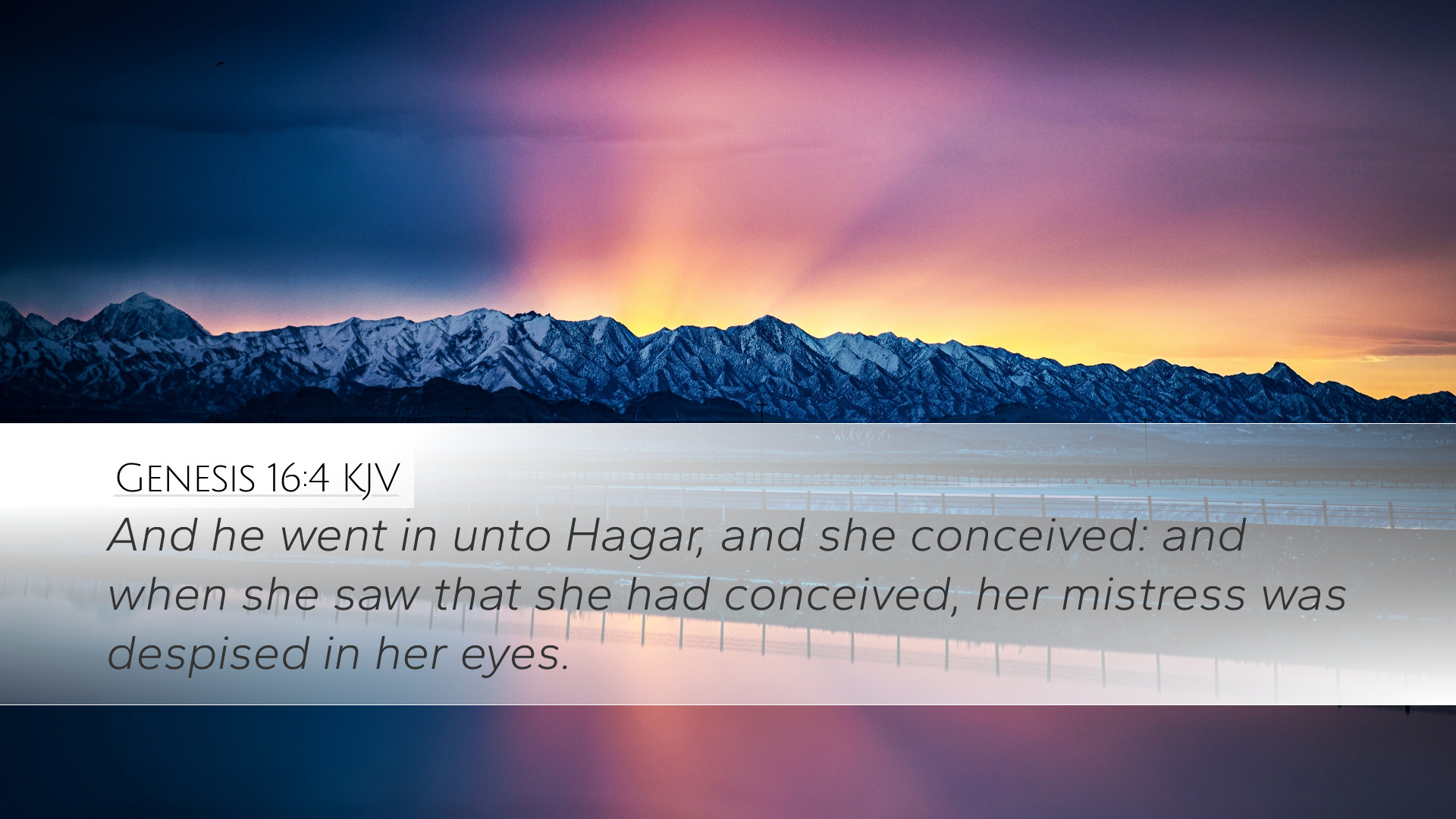Commentary on Genesis 16:4
Genesis 16:4 (KJV): "And he went in unto Hagar, and she conceived: and when she saw that she had conceived, her mistress was despised in her eyes."
Introduction
This verse is a pivotal moment in the narrative of Abraham and Sarah, illustrating the complexities of human relationships and divine promises. Genesis 16 details the actions taken by Sarah, and the implications of these actions reverberate throughout the biblical history. We delve into the insights provided by public domain commentaries to fully understand the depth of this verse.
Contextual Overview
The background of Genesis 16 centers on the promise of God to Abraham regarding progeny. Despite God’s assurance, Abraham and Sarah’s impatience leads them to seek a solution through Hagar, Sarah's Egyptian maid. This choice introduces conflict and a series of consequences, reflecting both human frailty and the important theme of faith in God’s timing.
Exegesis of the Verse
The key elements of Genesis 16:4 involve the actions of Abraham, Hagar's conception, and the subsequent emotional turmoil experienced by Sarah:
- Abraham’s Actions: The phrase "he went in unto Hagar" indicates a physical union, highlighting Abraham's compliance with Sarah’s suggestion. This underscores a moment of weakness in Abraham’s character, as he is drawn into a plan that deviates from God’s original covenant promise.
- Hagar's Conception: Hagar conceiving is significant for several reasons. It represents a fulfillment of the humanly devised plan of Sarah, yet reminds the readers that human efforts to fulfill divine promises can lead to unexpected outcomes.
- Sarah’s Emotional Response: The despising of Sarah by Hagar once she conceives introduces immediate conflict. This illustrates the jealousy and rivalry that can arise from human schemes. Sarah’s feelings reflect the complex dynamics of power and submission inherent in this situation.
Insights from Commentaries
Matthew Henry
Matthew Henry comments on the folly of Sarah's plan to use Hagar as a surrogate. He highlights that this decision stems from a lack of faith in God’s promise and a hurried attempt to secure fulfillment. Henry observes that Hagar’s conception brought a change in the dynamics between the women, creating tension and leading Sarah to feel despised.
Albert Barnes
Albert Barnes emphasizes the cultural context in which this narrative takes place, where it was common for women to bear children through maidens. Barnes points out that this practice, while socially accepted, does not align with God’s original design for marriage and family. He warns of the consequences of trying to circumvent God’s will, as this act leads not only to personal strife but also has lasting repercussions for Abraham’s lineage.
Adam Clarke
Adam Clarke provides a thorough analysis of the implications of Hagar's despising of Sarah. He notes that the term used to describe Hagar’s attitude reflects a feeling of superiority, which is significant as it reveals the human propensity to compare oneself with others. Clarke invites readers to consider the spiritual ramifications of this act of pride and the ensuing discord it brings into the household, serving as a reminder of the need for humility.
Theological Reflections
This verse and its surrounding contexts provide rich material for theological reflection:
- Human Sinfulness: The actions of Abraham and Sarah illustrate the human condition characterized by doubt and impatience. It serves as a reminder of the need for reliance on God amidst challenging circumstances.
- Divine Sovereignty: God's promises remain steadfast despite human failings. While Sarah and Abraham seek to fulfill God's promise through their own means, God’s plan unfolds in unexpected ways that ultimately lead to the fulfillment of His covenant.
- Interpersonal Relationships: This verse highlights the complexities of relationships when human desires and divine will collide. It raises important questions about power dynamics, jealousy, and the consequences of envy in human interactions.
Conclusion
Genesis 16:4 is rich with meaning, inviting readers to reflect on the implications of their own faith journeys. The commentary insights from Matthew Henry, Albert Barnes, and Adam Clarke enrich our understanding of the text, offering perspectives that encourage deeper contemplation on the themes of faith, providence, and human relationships. As pastors, students, and scholars engage with this verse, they are reminded of the importance of trusting in God's timing and plan, even when circumstances appear daunting.


